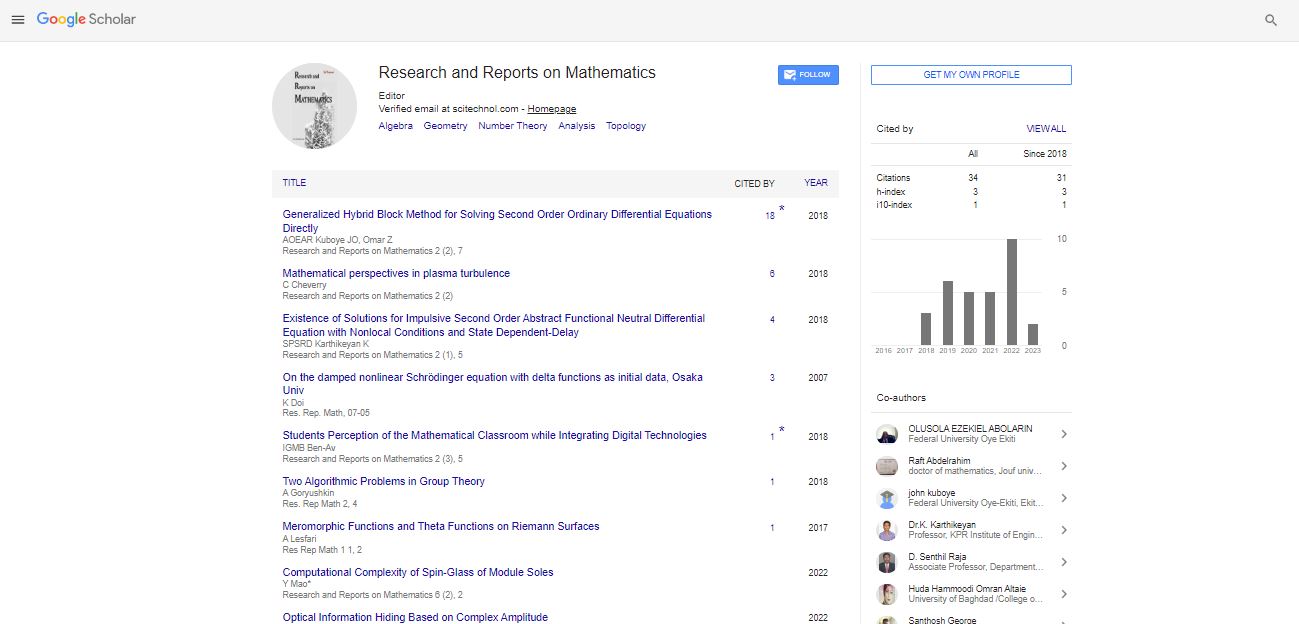Commentary, Res Rep Math Vol: 7 Issue: 4
The Digital Impact of Mathematical Logic
Jung Megan*
1Department of Mathematics, University of Florida, Florida, USA
*Corresponding Author: Jung Megan,
Department of Mathematics, University of
Florida, Florida, USA
E-mail: jung.megan@uf.edu
Received date: 28 July, 2023, Manuscript No. RRM-23-113481;
Editor assigned date: 30 July, 2023, Pre QC No. RRM-23-113481 (PQ
Reviewed date: 14 August, 2023, QC No. RRM-23-113481;
Revised date: 23 August, 2023, Manuscript No. RRM-23-113481 (R);
Published date: 31 August, 2023, DOI: 07.4172/rrm.10001205
Citation: Megan J (2023) The Digital Impact of Mathematical Logic. Res Rep Math 7:4.
Description
Mathematics is often described as the language of the universe, and at the heart of this language lies the powerful tool of mathematical logic. Mathematical logic is the study of formal systems, propositions, and reasoning, and it serves as the foundation for rigorous mathematical proofs and the development of mathematical structures. In this exploration, we delve into the fundamentals of mathematical logic, unveiling its significance in mathematics and beyond. The roots of mathematical logic can be traced back to ancient Greece when philosophers like Aristotle began categorizing propositions and studying logical relations. However, the formalization of mathematical logic as we know it today began in the 19th century with the works of mathematicians like George Boole and Augustus De Morgan. Their efforts laid the groundwork for a formal system to analyze the validity of logical arguments.
To systematically analyze the truth values of complex propositions, mathematicians use truth tables. Truth tables show all possible combinations of truth values for the component propositions and the resulting truth values of the compound proposition. Mathematical logic provides a rigorous framework for proving mathematical theorems. A formal proof is a sequence of statements, each of which is either an axiom or follows from previously proven statements using well-defined rules of inference. These rules ensure that each step in the proof is logically valid. Deductive reasoning is the process of using logical rules to draw conclusions from a set of premises. In mathematical logic, a deductive argument is considered valid if the conclusion must be true whenever the premises are true. This property is the essence of mathematical proof. One of the profound insights of mathematical logic is the realization that mathematical structures, such as groups, rings, and fields, can be described using axiomatic systems. An axiomatic system consists of a set of axioms, or fundamental assumptions, from which the properties of a mathematical structure can be deduced.
For instance, Euclidean geometry is based on a set of axioms, including the parallel postulate, from which all the properties of Euclidean space follow. By altering these axioms, non-Euclidean geometries like hyperbolic and elliptic geometry emerge, leading to alternative mathematical universes. In the early 20th century, Kurt Gödel rocked the mathematical world with his incompleteness theorems. He demonstrated that no sufficiently rich axiomatic system, including arithmetic, can be both complete and consistent. Completeness means that every true mathematical statement can be proven, while consistency means that contradictory statements cannot be proven. Gödel's theorems, which shook the foundations of mathematics, showed that there are mathematical truths that are forever beyond the reach of formal proof within a particular system. This profound result has implications not only in mathematics but also in philosophy and computer science. The applications of mathematical logic extend far beyond the realm of mathematics itself. In computer science, formal logic underpins the design and analysis of algorithms, programming languages, and artificial intelligence systems. Propositional and predicate logic are essential tools for representing and reasoning about computer programs.
In philosophy, mathematical logic is invaluable for dissecting arguments and assessing their validity. It enables philosophers to analyze complex, abstract ideas with precision and rigor, making it a fundamental tool in the philosopher's toolkit. Mathematical logic serves as the backbone of mathematics, providing the tools and language necessary for rigorous reasoning and formal proofs. It underpins not only the development of mathematical structures but also finds applications in computer science, philosophy, and various fields where precise reasoning is required. As an integral part of the intellectual landscape, mathematical logic continues to shape our understanding of the world and the way we think about complex problems.
 Spanish
Spanish  Chinese
Chinese  Russian
Russian  German
German  French
French  Japanese
Japanese  Portuguese
Portuguese  Hindi
Hindi 